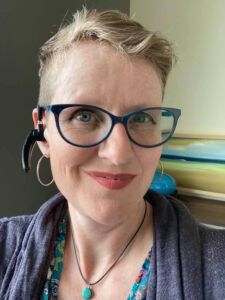
In honor of Mental Health Awareness Month, Indy Maven is taking a look at therapy in all of its varied forms. We at Indy Maven consider this Need to Know info. After all, according to the American Psychiatric Association, “Each year 1 in 5 women in the United States has a mental health problem such as depression, post-traumatic stress disorder (PTSD), or an eating disorder.”
Listen, talk therapy isn’t going anywhere. But the range of therapy modalities now available has grown exponentially. So, sure, many of the therapies listed below are versions of talk therapy. Or they begin with sitting and chatting with your therapist, then the therapist may suggest something beyond talk therapy. If you have a particular struggle, more often than not, there are options out there to suit you, your personality and your struggles. And you deserve to find the right fit.
Do you know what else you deserve? To find a therapy and a therapist that work for you. Lesley Meier MS, MA, LMFT, believes this whole-heartedly. “I would invite people to do their own research on any therapeutic modality to decide if it is for them. Also, please try out more than one therapist! Therapy is an investment of time and money. A good therapist will invite you to determine if the relationship is a good fit and check to be sure you are getting what you need. Research says that beyond the modality, the client and therapist relationship is the most important factor in the success of therapy. Meaning, do we like the therapist and do we believe therapy will help? Are we comfortable with the interventions – do they make sense to us?”
Below we offer a roundup of different types of therapies provided by Central Indiana therapists. This list, like all our lists, is not exhaustive. What’s more, these therapists don’t exclusively use the techniques they speak to in this article. As with all women, they wear many hats. Luz Catalina Escamilla, for example, susses out DBT for us, but she also uses her bilingual abilities and her training to serve migrant children throughout the state, as well as those addicted to opiates.
Acceptance and Commitment Therapy (ACT)
“Acceptance and Commitment Therapy (ACT for short) is a third-wave contextual therapy that utilizes mindfulness & sensory-based practice, self-as- context processing and value congruent behavior change strategies, all in an effort to move us toward a life we want to be present for and less yanked around by our internal experiences. In practice, ACT helps us increase self-compassion as people existing within the context of society, families, and the human mind; encourages us to witness our thoughts/feelings and sensations with greater ease; and encourages us to live in alignment with who we say we want to be in this present moment. ACT is both an evidence-based and deeply soulful approach to increasing one’s psychological flexibility, thereby decreasing our experience of suffering. Simply said, ACT invites us to embody something like, ‘The way out is through (and please be kind to yourself on the trip).’”
context processing and value congruent behavior change strategies, all in an effort to move us toward a life we want to be present for and less yanked around by our internal experiences. In practice, ACT helps us increase self-compassion as people existing within the context of society, families, and the human mind; encourages us to witness our thoughts/feelings and sensations with greater ease; and encourages us to live in alignment with who we say we want to be in this present moment. ACT is both an evidence-based and deeply soulful approach to increasing one’s psychological flexibility, thereby decreasing our experience of suffering. Simply said, ACT invites us to embody something like, ‘The way out is through (and please be kind to yourself on the trip).’”
– Lauren Hall Bushman, (she/they), RYT, LCSW. Lauren is one of our 2023 Women to Watch works at Irvington Counseling Center. She is also one of Indy Maven’s 2023 Women to Watch.
Art Therapy

“Art therapy is a form of psychotherapy practiced by a Master’s level art therapy clinician who meets with a client who may or may not have any prior art experience. There is so much in any human life that doesn’t fit into words, and sometimes the way we tell ourselves and others our stories can get us stuck. Art therapy can help expand how we see and know these stories and eventually put words to the parts that need to be spoken to help us feel less pain. The art made in session doesn’t have to look pretty to help this happen. “
– Maggie Girard, MA, ATR-BC, LMHC. Maggie currently practices art therapy in IU Health’s Neurology clinic, IU Health’s LifeCare HIV clinic, and in private practice with kids and teens at My Renewal Counseling.
BIPOC Therapy

“BIPOC therapy is a way for people of color to resist further the definition of what it means to be Black in America, as defined by white supremacy. The Black experience has always been viewed through a dominant cultural perspective, with little regard for who tells our stories. In therapy sessions, my main objective is to empower people of color to confidently express their experiences and cultivate connections with their community. One modality that I frequently use is Narrative Therapy, which focuses on exploring enactment, playfulness, creativity, self-narration and change. Through Narrative Therapy, people of color can take control of their storytelling, directing, facilitating and inspiring their own narratives.”
– Teresa Parker, MA Candidate. Teresa is currently a Clinical Mental Health Intern at Irvington Council Collective.
Couples Therapy

“Relationships matter and hold infinite capacity to help people experience life more fully and richly. They are meant to be more than survived. Couples therapy helps couples of all kinds engage with one another deeply to help build a relationship that feels good and connected to both people. It can be useful for couples struggling with specific conflict patterns or issues –as well as couples who feel disoriented and unsure of exactly what the disconnect or ‘problem’ is in their relationship, but who know they want more. Couples therapy is a safe place for couples to prioritize their relationship and work together to build and experience the relationship they desire.”
– Michele Prible, Licensed Marriage and Family Therapist (LMFT). Michele owns Open Spaces Indy.
Eye movement desensitization and reprocessing (EMDR)

According to the EMDR Institute, this psychotherapy treatment can help people heal from symptoms and emotional distress that continue to plague one’s life today. But it can help heal much more rapidly than traditional psychotherapy. “EMDR is a type of therapy used to help individuals who have experienced trauma or distressing life events. It involves using bilateral stimulation to help the brain process and integrate traumatic memories in a more adaptive way, leading to a reduction in associated symptoms.”
– Rachael Bain, LCSW. Rachel works at Healing Self Therapy, LLC.
Gestalt Therapy
 “Gestalt therapy has been around since the 1940s and is practiced around the world. It can be profoundly impactful. As I experience it, Gestalt therapy happens in the present moment between the therapist and the client and the client and themselves through spontaneous and aware dialogue. It is focused on the client’s experience in their body in real-time as they recall and talk about their experiences. Gestalt therapy supports clients in letting go of old patterns of behavior that have become stuck and inflexible causing problems in their current lives through real-time “experiments” that can include using role-play, exaggeration of movement and feeling, and ’empty chair’ or ‘two chair’ conversations with parts of themselves or others. Gestalt therapy helps clients move through unexpressed or ignored emotion and come into better relationship with themselves and others.”
“Gestalt therapy has been around since the 1940s and is practiced around the world. It can be profoundly impactful. As I experience it, Gestalt therapy happens in the present moment between the therapist and the client and the client and themselves through spontaneous and aware dialogue. It is focused on the client’s experience in their body in real-time as they recall and talk about their experiences. Gestalt therapy supports clients in letting go of old patterns of behavior that have become stuck and inflexible causing problems in their current lives through real-time “experiments” that can include using role-play, exaggeration of movement and feeling, and ’empty chair’ or ‘two chair’ conversations with parts of themselves or others. Gestalt therapy helps clients move through unexpressed or ignored emotion and come into better relationship with themselves and others.”
– Lesley A. Meier, MS, MA, LMFT. Lesley works at Creative Awareness Counseling.
Brainspotting
“Brainspotting is an intervention pioneered by David Grand based on the idea that ‘where you look affects how you feel’. The therapist supports the client by having them find and use a fixed eye position (imagine gazing off in the distance as you talk about a painful memory) and internal awareness (noticing how you feel inside your body) to process emotion and traumatic events without having to compartmentalize or cut off their experience. Brainspotting is client-centered, and the therapist follows the client’s experience making space for any thoughts, feelings and memories without the need for interpretation. I refer people to this website to learn more.”
– Lesley A. Meier, MS, MA, LMFT
Internal Family Systems
“I am not an expert in IFS – I have only done reading. It is a newer framework using existing ideas from many therapeutic modalities that prioritizes the idea that we each have an ‘Internal Family System’ of different parts designed to keep us safe in the world. But just like in a real-life family, there can be disputes and miscommunications that cause distress. I would refer people to this website. I also suggest the book “No Bad Parts: Healing Trauma and Restoring Wholeness” by Richard Schwartz.”
– Lesley A. Meier, MS, MA, LMFT
Dialectical Behavioral Therapy (DBT)
 According to the Cleveland Clinic, DBT is a form of talk therapy for people who experience intense emotions. A form of talk therapy, it can be used for borderline personality disorder but is used for other mental health conditions as well. “DBT helps folks stay in the moment in order to regulate their emotions better. Mindfulness, one of the foundation skills, is useful in helping people slow down, remove any judgments and radically accept things as they are. So you work then on goals in the here and now, and you put energy into things you have control over, not the things that you don’t.”
According to the Cleveland Clinic, DBT is a form of talk therapy for people who experience intense emotions. A form of talk therapy, it can be used for borderline personality disorder but is used for other mental health conditions as well. “DBT helps folks stay in the moment in order to regulate their emotions better. Mindfulness, one of the foundation skills, is useful in helping people slow down, remove any judgments and radically accept things as they are. So you work then on goals in the here and now, and you put energy into things you have control over, not the things that you don’t.”
– Luz Catalina Escamilla, LMSW, CAS, TFCBT. Luz works at Prime Movement.
LGBTQ Affirmation Therapy
“I work on letting the individual or families involved to know just how wonderful they are while discussing and addressing the negative influences of discrimination and hatred. I believe in treating people with the dignity and respect they deserve without the person needing to change anything about themselves to receive quality care. I am involved with LGBTQ community events, especially with the Metropolitan Church community. I am a staunch advocate of providing the necessary resources to anyone needing them, especially those designated as members of the LGBTQ community.”
– Luz Catalina Escamilla, LMSW, CAS, TFCBT
Perinatal mental health
 “Perinatal mental health includes working with people who are considering parenthood, trying to conceive, pregnancy, miscarriage or abortion, birth itself, and the postpartum transition into life as a parent. During these times, much anxiety is often present, and sometimes there are additional challenges such as grief, depression or new diagnoses that arise. I love helping people embrace the life task of uncertainty and meet them where they have the space to explore their true needs in the midst of so much change.”
“Perinatal mental health includes working with people who are considering parenthood, trying to conceive, pregnancy, miscarriage or abortion, birth itself, and the postpartum transition into life as a parent. During these times, much anxiety is often present, and sometimes there are additional challenges such as grief, depression or new diagnoses that arise. I love helping people embrace the life task of uncertainty and meet them where they have the space to explore their true needs in the midst of so much change.”
– Adair McDonald, LMHC (she/her/hers). Adair works in community mental health and you can book a session with her directly on adairmcdonald.com.
Trauma-Informed Therapy
“We’ve all experienced trauma. Some refer to it as big T (like being attacked or in an accident) or little t (like years of being told you’re not good enough). I work with folks to understand how those experiences have shaped their thoughts, feelings, behaviors, relationships and choices. From there, positive changes and true self-acceptance and love can grow. I am highly collaborative, which is especially important for survivors of trauma who’ve had their power taken by others in the past. I strive to foster a creative and courageous environment that is tailored to each client using narrative and somatic approaches, including EMDR.”
– Adair McDonald, LMHC (she/her/hers)
Somatic Healing
 “Somatic healing allows the individual to better address the visceral responses associated with complex trauma to calm the nervous system. This can be done through vagal stimulations of deep breathing and body movement. Through regulating the nervous system individuals are better equipped for healthy emotional regulation, which will in turn boost mental and physical health. This practice further allows the opportunity to dig deeper into our unconscious awareness to unpack those negative core beliefs and societal messaging contributing towards automatic thought patterns, typically attributing to emotional and physical symptoms.”
“Somatic healing allows the individual to better address the visceral responses associated with complex trauma to calm the nervous system. This can be done through vagal stimulations of deep breathing and body movement. Through regulating the nervous system individuals are better equipped for healthy emotional regulation, which will in turn boost mental and physical health. This practice further allows the opportunity to dig deeper into our unconscious awareness to unpack those negative core beliefs and societal messaging contributing towards automatic thought patterns, typically attributing to emotional and physical symptoms.”
– Morgan Albrecht, LCSW. Morgan works at The Counseling Center.
Substance Use Therapy

“Substance use therapy is a form of behavioral therapy. It is perhaps the most commonly utilized treatment for addiction and is used frequently during substance rehabilitation. Substance use therapy typically follows a set curriculum of evidence-based therapeutic interventions to treat people who struggle with substance use disorder (SUD). We offer both individual SUD therapy, as well as group SUD. We are just opening enrollment for a teen SUD group as well to better support the mental health of our teens and young adults. Providing these groups virtually allows for greater access to care and helps to eliminate stigmas associated with attending in person, too!”
– Acquinnetta Doughty, LCAC, MBA, MPA. Acquinnetta works at Prime Movement.
Trans Support Group Therapy

“Trans support group therapy is basically for people who are trying to be their most genuine self. They are already who they want to be inside but need support with the steps that come with being that person on the outside. Like a caterpillar and butterfly situation, we are all in the chrysalis at some point. It’s unique to see the group in all different stages supporting one another and sharing experiences. Supporting each other is really being who we are meant to be as Hoosiers and humans.”
– Christina “Rina” Riddle MSW LSW. Rina works at Prime Movement.
Maura Malloy is a writer, minimalist, TedX Talker, and Indy Maven’s Assistant Editor.
All of our content—including this article—is completely free. However, we’d love it if you would please consider supporting our journalism with an Indy Maven membership.

